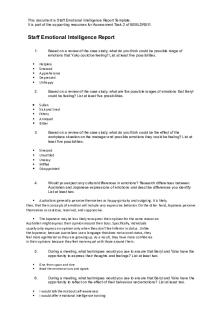Task 3 - staff emotional intelligence report BSBLDR511 PDF

| Title | Task 3 - staff emotional intelligence report BSBLDR511 |
|---|---|
| Author | Puja Thapa |
| Course | Diploma of leadership and management |
| Institution | International College of Management |
| Pages | 2 |
| File Size | 71.2 KB |
| File Type | |
| Total Downloads | 66 |
| Total Views | 205 |
Summary
staff emotional intelligence report
BSBLDR511...
Description
This document is Staff Emotional Intelligence Report Template. It is part of the supporting resources for Assessment Task 2 of BSBLDR511.
Staff Emotional Intelligence Report 1.
Based on a review of the case study, what do you think could be possible range of emotions that Yuko could be feeling? List at least five possibilities. Helpless Stressed Apprehensive Depressed Unhappy
2.
Based on a review of the case study, what are the possible ranges of emotions that Beryl could be feeling? List at least five possibilities. Sullen Sick and tired Jittery Annoyed Bitter
3.
Based on a review of the case study, what do you think could be the effect of the workplace situation on the manager and possible emotions they could be feeling? List at least five possibilities. Stressed Unsettled Uneasy Miffed Disappointed
4.
Would you expect any cultural differences in emotions? Research differences between Australian and Japanese expressions of emotions and describe differences you identify. List at least two.
Australians generally perceive themselves as happy-go-lucky and outgoing. It is likely, then, that their concepts of emotion will include very expressive behavior. On the other hand, Japanese perceive themselves as cautious, reserved, and suppressive. The Japanese may be less likely to express their opinion for the same reason an Australian might express their opinion around their boss. Specifically, individuals usually only express an opinion only when they don't feel inferior in status. Unlike the Japanese, because Australians use a language that does not accord status, they feel more egalitarian as they are growing up. As a result, they have more confidence in their opinions because they feel more equal with those around them. 5.
Give them space and time Read the emotional cues and signals
6.
During a meeting, what techniques would you use to ensure that Beryl and Yuko have the opportunity to express their thoughts and feelings? List at least two.
During a meeting, what techniques would you use to ensure that Beryl and Yuko have the opportunity to reflect on the effect of their behaviour and emotions? List at least two. I would talk them about self-awareness I would offer emotional intelligence training
7.
What advice could you give to Beryl and Yuko to assist them in self-managing their emotions? List at least five tips. Stay Calm. Listen to Understand. Accentuate the Positive. Avoid the Blame Game. Focus on the Future, Not the Past.
8.
Document a step-by-step approach for resolving the workplace situation. As a guide, you should list between 6 to 8 steps. Clarify what the disagreement is Establish a common goal for both parties. Discuss ways to meet the common goal. Determine the barriers to the common goal. Agree on the best way to resolve the conflict. Acknowledge the agreed upon solution and determine the responsibilities each party has in the resolution.
9.
Prepare questions (at least five) to ask Beryl and Yuko at the meeting. The questions should help you to find out more about the situation and their thoughts and feelings. Ensure that your questions are open questions to encourage discussion. Your questions should ensure that you: Identify information about the workplace situation
Provide opportunities for Yuko and Beryl to express their thoughts and feelings?
What would you like to see happen? What does that look like for you? What would it take for us to be able to move forward? How do we get there? Are you willing to share the impact this has had on you? Are you willing to hear my perspective? What ideas do you have that would meet both our needs? What about this situation is most troubling to you? What’s most important to you?
BSBLDR511 Develop and use emotional intelligence Vocational Training Institute RTO 41111 CRICOS 03487C Version 5.0 © J&S Learningwork 2018
Page 1 of 1...
Similar Free PDFs

Emotional Intelligence
- 3 Pages

Unit 5 - Emotional Intelligence
- 4 Pages

Lecture 6 Emotional Intelligence
- 26 Pages

Staff Training Report
- 5 Pages
Popular Institutions
- Tinajero National High School - Annex
- Politeknik Caltex Riau
- Yokohama City University
- SGT University
- University of Al-Qadisiyah
- Divine Word College of Vigan
- Techniek College Rotterdam
- Universidade de Santiago
- Universiti Teknologi MARA Cawangan Johor Kampus Pasir Gudang
- Poltekkes Kemenkes Yogyakarta
- Baguio City National High School
- Colegio san marcos
- preparatoria uno
- Centro de Bachillerato Tecnológico Industrial y de Servicios No. 107
- Dalian Maritime University
- Quang Trung Secondary School
- Colegio Tecnológico en Informática
- Corporación Regional de Educación Superior
- Grupo CEDVA
- Dar Al Uloom University
- Centro de Estudios Preuniversitarios de la Universidad Nacional de Ingeniería
- 上智大学
- Aakash International School, Nuna Majara
- San Felipe Neri Catholic School
- Kang Chiao International School - New Taipei City
- Misamis Occidental National High School
- Institución Educativa Escuela Normal Juan Ladrilleros
- Kolehiyo ng Pantukan
- Batanes State College
- Instituto Continental
- Sekolah Menengah Kejuruan Kesehatan Kaltara (Tarakan)
- Colegio de La Inmaculada Concepcion - Cebu











